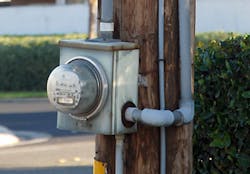What's Wrong Here?
Here’s your chance to moonlight as an electrical inspector and second-guess someone else’s work from the safety of your living room or office. Can you identify the Code violation(s) in this photo?
Hint: Electrician, cable TV technician, or plumber?
Find the Answer
How well do you know the Code? Think you can spot violations the original installer either ignored or couldn't identify? Here's your chance to moonlight as an electrical inspector and second-guess someone else's work from the safety of your living room or office. Can you identify the Code violation(s) in this photo?
‘TELL THEM WHAT THEY'VE WON…’
Using the 2008 NEC, correctly identify the Code violation(s) in this month's photo — in 200 words or less — and you could win something to put in your toolbox. E-mail your response to [email protected], and we'll select three winners (excluding manufacturers and prior winners) at random from the correct submissions. Winners will receive a set of insulated hand tools from Ideal Industries, Inc., valued at more than $125.* The set includes 9.25-in. insulated side-cutting pliers, 10-in. insulated tongue-and-groove pliers, and a 0.25-in. × 6-in. insulated screwdriver. (* Please allow six to eight weeks for delivery of tools.)
January Winners
Our three winners this month were: Joseph M. Pawell, senior electrical engineer, Skibinski Associates, State College, Pa.; Corey Zachel, P.E., LEED AP, electrical engineer, Buehrer Group Architecture & Engineering, Inc., Maumee, Ohio; and James A. Childers, electrical engineer technician, Directorate of Public Works, Operation Branch/Electric Section, Ft. Leonard Wood, Mo.
The list of violations associated with this service drop is quite lengthy, so we'll focus on the most obvious:
-
110.14 — Dissimilar metals shall not be placed in contact with each other, unless specifically identified for the purpose and conditions of use.
-
110.14(B) and 230.46 — Splices shall be identified for the use and covered with an insulation equivalent to that of the conductor.
-
230.22 and 230.41 — Service conductors shall be insulated or covered.
-
230.54(C, D, F, and G) — Service head to be located above service drop conductor attachment point and service cables held securely in place. Drip loops required and to be arranged so water will not enter the service raceway.
-
250.8 and 250.24 — The plumbing strap around the service mast is not an approved or effective means of grounding, and the neutral, guy wire, and weather head appear bonded and grounded ahead of the service disconnecting means, not on the load side.
